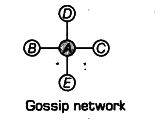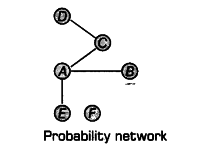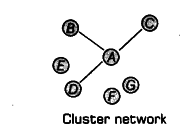Ask questions which are clear, concise and easy to understand.
Ask QuestionPosted by Juhi Kumari 5 years, 6 months ago
- 1 answers
Posted by Miriyalkar Sathwik 5 years, 6 months ago
- 2 answers
Gaurav Seth 5 years, 6 months ago
The software company promoted by Narayana Murthy Infosys. Mr. Murthy is an IT industrialist and worked with Indian Institute of Management, Ahmedabad, before starting Infosys Limited, a multinational company which provides technology, business consulting, outsourcing services and engineering. Set up in Bengaluru, it is the second largest IT firm in India.
Posted by Miriyalkar Sathwik 5 years, 6 months ago
- 1 answers
Yogita Ingle 5 years, 6 months ago
The network of informal communication is called ‘grapevine’. This is because it spreads throughout organisation with its branches going out in all directions.
Grapevine Networks
Some popular grapevine networks are as follows:
(i) Single strand network In this network, each person communicate with another in a sequence.

(ii) Gossip network In this network, one person communicates with all on non-selective basis.

(iii) Probability network In this network, any person can communicate with anyone else randomly.

(iv) Cluster network In this network, an individual communicates with only those people whom he trusts.

Posted by Ramneet Dhaliwal 5 years, 6 months ago
- 1 answers
Gaurav Seth 5 years, 6 months ago
The manager does not believe in keeping the morale high by being participative. He believes in an autocratic style of functioning. He is not a good leader of men, probably lacking in personal confidence.
Those managers are true leaders of men who encourage subordinates to voice their opinions about tasks, be participative, encourage their subordinates to do their tasks well without any fear of failure, are good listeners and are able to delegate.
Posted by Gajendra Kachhawaha 5 years, 6 months ago
- 0 answers
Posted by Reshma Ramesh 5 years, 6 months ago
- 1 answers
Gaurav Seth 5 years, 6 months ago
It is trying to fulfill its objective of social responsibility. Every firm has a social responsibility to work for the welfare of the society along with the objective of profit maximization. By offering job to the physically challenged persons it is helping the society.
Posted by Reshma Ramesh 5 years, 6 months ago
- 2 answers
Reshma Ramesh 5 years, 6 months ago
Gaurav Seth 5 years, 6 months ago
Principle of Equity:
The principle of ‘Equity’ emphasizes kindliness and justice in the behaviour of managers towards works. According to Fayol, employees can be made to put in their best only when they are given kind, fair and just treatment.
Posted by Khushpreet Kaur 5 years, 6 months ago
- 1 answers
Arpit Yadav 5 years, 6 months ago
Posted by Reshma Ramesh 5 years, 6 months ago
- 0 answers
Posted by Reshma Ramesh 5 years, 6 months ago
- 1 answers
Yogita Ingle 5 years, 6 months ago
Esprit de Corps
The management principle ‘esprit de corps’ of the 14 principles of management stands for striving for the involvement and unity of the employees. Managers are responsible for the development of morale in the workplace, individually and in the area of communication. Esprit de corps contributes to the development of the culture and creates an atmosphere of mutual trust and understanding.
Posted by Mani Priya Min Ju 5 years, 6 months ago
- 2 answers
Aaiman Farhin 5 years, 6 months ago
Posted by Mani Priya Min Ju 5 years, 6 months ago
- 2 answers
Adarsh Raj 5 years, 6 months ago
Aaiman Farhin 5 years, 6 months ago
Posted by Mani Priya Min Ju 5 years, 6 months ago
- 1 answers
Adarsh Raj 4 years, 9 months ago
Posted by Mani Priya Min Ju 5 years, 6 months ago
- 1 answers
Adarsh Raj 5 years, 6 months ago
Posted by Kartik Kashodhan 5 years, 6 months ago
- 2 answers
Adarsh Raj 5 years, 6 months ago
Yogita Ingle 5 years, 6 months ago
Training is the act of increasing the knowledge and skill of an employee for doing a particular job.
The significant differences between training and education are mentioned in the following points:
1.Training refers to an act of inculcating specific skills in a person. Education is all about gaining theoretical knowledge in the classroom or any institution.
2.Training is a way to develop specific skills, whereas education is a typical system of learning.
3.Training is completely based on practical application, which is just opposite in the case of education that involves theoretical orientation.
4.The concept of training is narrow while the concept of education is comparatively wider.
5.Training involves hands-on experience regarding the particular job. On the other hand, education involves learning in the classroom.
6.The term of education is longer than the duration of training.
7.The training prepares a person for the present job. Conversely, education prepares a person for future job and challenges.
8.The purpose of training is to improve the performance and productivity of employees. As opposed to education, where the purpose is to develop a sense of reasoning and judgement.
9.During training, a person learns, how to do a specific task. Unlike Education, which teaches about the general concepts.
Posted by Drishti Jain 5 years, 6 months ago
- 2 answers
Posted by Abhinav Saini 5 years, 6 months ago
- 3 answers
Gaurav Seth 5 years, 6 months ago
the functions are key to management in all levels, from the entry positions to higher roles of management. Furthermore, each five functions – planning, organizing, staffing, directing and controlling – are linked to each other.
Posted by Baap Of All. 5 years, 6 months ago
- 2 answers
Adarsh Raj 5 years, 6 months ago
Saloni Jain 5 years, 6 months ago
Posted by Sachin Dadwal 5 years, 6 months ago
- 3 answers
Adarsh Raj 5 years, 6 months ago
Sourav Mishra 5 years, 6 months ago
Yogita Ingle 5 years, 6 months ago
Importance of Management
(i) Management Helps Achieving Group Goals It integrates the objective of individual along with organisational goal.
(ii) Management Increases Efficiency It increases productivity through better planning, organising, directing the activities of the organisation.
Posted by Nelson D'Sa 5 years, 6 months ago
- 1 answers
Yogita Ingle 5 years, 6 months ago
PROCESS OF STAFFING
1. Estimating Manpower Requirement: It involves the following:
(a) Making inventory of current human resources in terms of qualification, training & skills.
(b) Assessing future human resource needs of all departments.
(c) Developing a programme to provide the human resources. Job Analysis is an intensive way of finding details related to all jobs.
2.Recruitment: It refers to identification of the sources of manpower availability and making efforts to secure applicants for the various job positions in an organization.
3. Selection: It is the process of choosing and appointing the right candidates for various jobs in an organization through various exams, tests &interviews.
4. Placement and Orientation: When a new employee reports for duty, he is to be placed on the job for which he is best suited. Placement is very important process as it can ensure “Right person for right job”. Orientation/Induction is concerned with the process of introducing a new employee to the organization. The new employees are familiarized with their units, supervisors and fellow employees. They are also to be informed about working hours, procedure for availing leave, medical facilities, history and geography of organization and rules/regulations relating to their wages etc.
5. Training and Development: Systematic training helps in increasing the skills and knowledge of employees in doing their jobs through various methods.
Development involves growth of an employee in all respects. It is the process by which the employees acquire skills and competence to do their present jobs and increase their capabilities for higher jobs in future.
6. Performance Appraisal: It is concerned with rating or evaluating the performance of employees. Transfers and promotions of the staff are based on performance appraisal.
Posted by Sanjay Kumar 5 years, 6 months ago
- 1 answers
Gaurav Seth 5 years, 6 months ago
Economic Environment: It has immediate and direct economic impact on a business. Rate of interest, inflation rate, change in the income of people, monetary policy, price level etc. are some economic factors which could affect business firms. Economic environment may offer opportunities to a firm or it may put constraints.
Posted by Gaurav Aggarwal 5 years, 6 months ago
- 2 answers
Gaurav Seth 5 years, 6 months ago
IT is purely based on the scenario, applications or the environment where you want to apply.
But decentralisation has many advantages than centralisation.
Centralisation is a form of organisational structure where solely one unit is authorised to make autonomous decisions, set strategy, determine goals and objectives whereas Decentralisation relates to a transfer of power from a high level of government to a lower one. It is a form of organisational structure where several units are authorised to make autonomous decisions.
Decentralisation is better than centralisation because decentralisation focuses on the individual needs of people. A system can’t work properly by individuality. It needs monitoring from different sources. If a single entity works for a society there are major chances of irregular functioning. Power should not be in a single hand but it should be dispersed so that people are not dependent on one party. Also decentralisation makes the execution faster as it reduces the burden on a single entity.
Posted by Gaurav Aggarwal 5 years, 6 months ago
- 1 answers
Yogita Ingle 5 years, 6 months ago
Principle of untiy of command not hold good in the case of functional foremanship because according to the principle of Unity of Command, any person should be answerable to just one boss. If an individual receives command from two or more people then, this principle is violated. However, under functional foremanship, the workers at the lower level management are assigned to take orders from eight foremen. That is, each worker has to follow the commands given by any of the eight foremen which is in violation to the principle of unity of command.
Posted by Sudhanshu Tomar 5 years, 6 months ago
- 2 answers
Gaurav Seth 5 years, 6 months ago
The concept referred here is 'Delegation'. Delegation implies transfer of authority, from a superior to his subordinate. It is an essential concept for effective organisation as it lowers the burden on the manager and thereby, facilitates the manager to focus on activities that command high priority. Also, the managers can extend his area of operations once he delegates the work to subordinates. In addition to this, it provides the subordinates with more opportunities for growth. It helps in efficient completion of tasks as the subordinates can now show their skills and exercise initiative.
Elements of delegation are:
(a) Authority: Authority refers to the right of an individual to command his subordinates and to take action within the scope of his position. It flows from top to bottom.
(b) Responsibility: Responsibility refers to the obligation of a subordinate to properly perform the assigned duty. It flows upwards.
(c) Accountability: Accountability refers to answerability to the outcome of the assigned task.
Posted by Tamil Selvan 5 years, 6 months ago
- 0 answers
Posted by Roshan Kumar 5 years, 6 months ago
- 1 answers
Yogita Ingle 5 years, 6 months ago
Main social objectives of management are included in the following list:
(i) To make available employment opportunities.
(ii) To save environment from getting polluted.
(iii) To contribute in improving living standard.
Posted by Anmol Bahubal 5 years, 6 months ago
- 1 answers
Arpit Yadav 5 years, 6 months ago
Posted by Sanjay Kumar 5 years, 6 months ago
- 3 answers
Adarsh Raj 5 years, 6 months ago
Kashish Agrawal 5 years, 6 months ago
Gaurav Seth 5 years, 6 months ago
- The ability to produce maximum output with limited resources is known as Efficiency. The level of the nearness of the actual result with planned result is Effectiveness.
- Efficiency is ‘to do the things perfect’ while Effectiveness is ‘to do perfect things’.
- Efficiency has a short run perspective. Conversely, the long run is the point of view of Effectiveness.
- Efficiency is yield-oriented. Unlike Effectiveness, which is result oriented.
- Efficiency is to be maintained at the time of strategy implementation, whereas strategy formulation requires Effectiveness.
- Efficiency is measured in operations of the organisation, but Effectiveness of strategies is measured which are made by the organisation.
- Efficiency is the outcome of actual output upon given the number of inputs. On the other hand, Effectiveness has a relationship with means and ends.

myCBSEguide
Trusted by 1 Crore+ Students

Test Generator
Create papers online. It's FREE.

CUET Mock Tests
75,000+ questions to practice only on myCBSEguide app
 myCBSEguide
myCBSEguide
Devanshu Gupta 5 years, 6 months ago
3Thank You